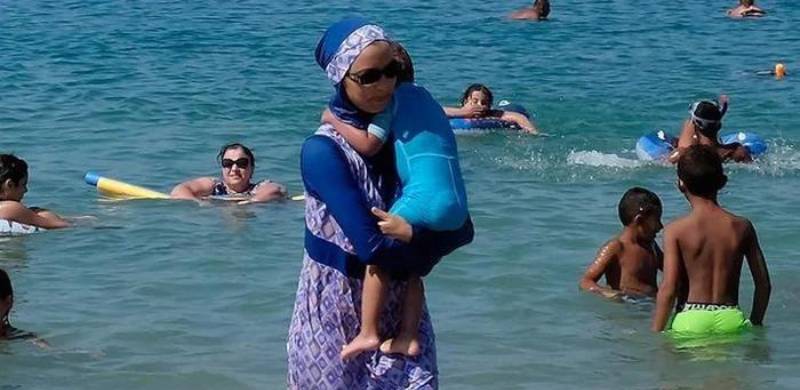
France's highest administrative court has blocked the city of Grenoble's attempt to allow burkinis to be worn at public swimming pools, upholding its ban on burkinis.
A burkini is a modest swimsuit, typically worn by Muslim women to keep their hair and bodies covered while at the beach or at swimming pools. Burkinis had been outlawed in public pools in many cities in France, which has very strict rules about the type of swimwear allowed in pools. The ban is also backed by the French fear of 'creeping Islamization' and a desire to 'maintain secular values'.
"The very selective exception to the rules to satisfy religious demands [...] risks affecting the proper functioning of public services and equal treatment of their users" the Council of State ruled on Tuesday.
The city of Grenoble decided to change the rules regarding this matter, and in May, had allowed all sorts of bathing suits, as well as allowed women to swim topless. The decision was led by Green party mayor Eric Piolle, who said, "All we want is for women and men to be able to dress how they want."
However, the judges of the Council of State disagreed and said on Tuesday, "Contrary to the objective declared by the city of Grenoble, the change to the pool rules aimed only to authorise the wearing of the 'burkini'".
The ruling of the top court backed a lower court ruling in May that was prompted by a challenge by the national government to the council's decision.
Following the judgement, the Grenoble city council said that it regretted that incorrect statements were being attributed to it. It argued that the proposed changes had been aimed at allowing equal access to all users to public services.
Meanwhile French Interior Minister Gerard Darmanin welcomed the ruling, describing it on Twitter as 'a victory for the law against separatism, for secularism and beyond that, for the whole republic'.
A burkini is a modest swimsuit, typically worn by Muslim women to keep their hair and bodies covered while at the beach or at swimming pools. Burkinis had been outlawed in public pools in many cities in France, which has very strict rules about the type of swimwear allowed in pools. The ban is also backed by the French fear of 'creeping Islamization' and a desire to 'maintain secular values'.
"The very selective exception to the rules to satisfy religious demands [...] risks affecting the proper functioning of public services and equal treatment of their users" the Council of State ruled on Tuesday.
The city of Grenoble decided to change the rules regarding this matter, and in May, had allowed all sorts of bathing suits, as well as allowed women to swim topless. The decision was led by Green party mayor Eric Piolle, who said, "All we want is for women and men to be able to dress how they want."
However, the judges of the Council of State disagreed and said on Tuesday, "Contrary to the objective declared by the city of Grenoble, the change to the pool rules aimed only to authorise the wearing of the 'burkini'".
The ruling of the top court backed a lower court ruling in May that was prompted by a challenge by the national government to the council's decision.
Following the judgement, the Grenoble city council said that it regretted that incorrect statements were being attributed to it. It argued that the proposed changes had been aimed at allowing equal access to all users to public services.
Meanwhile French Interior Minister Gerard Darmanin welcomed the ruling, describing it on Twitter as 'a victory for the law against separatism, for secularism and beyond that, for the whole republic'.

